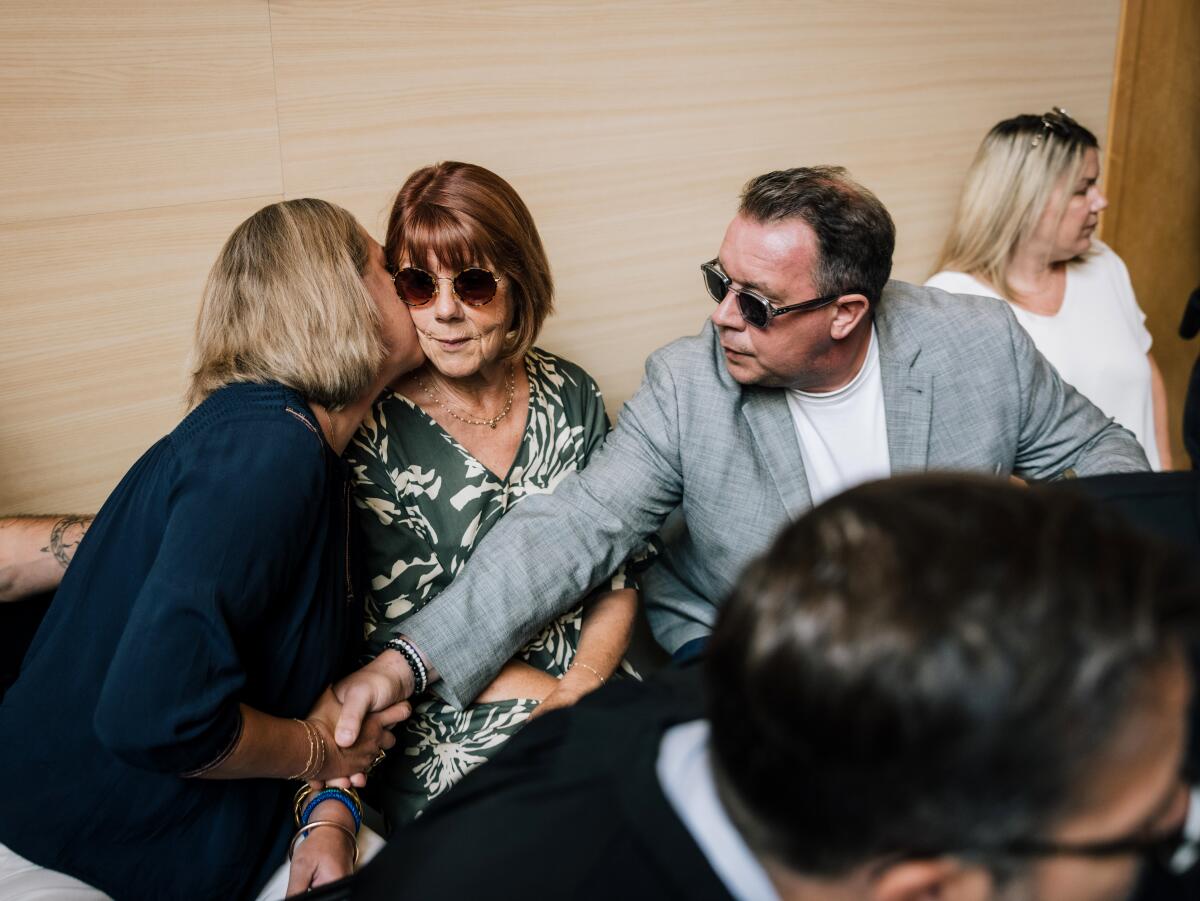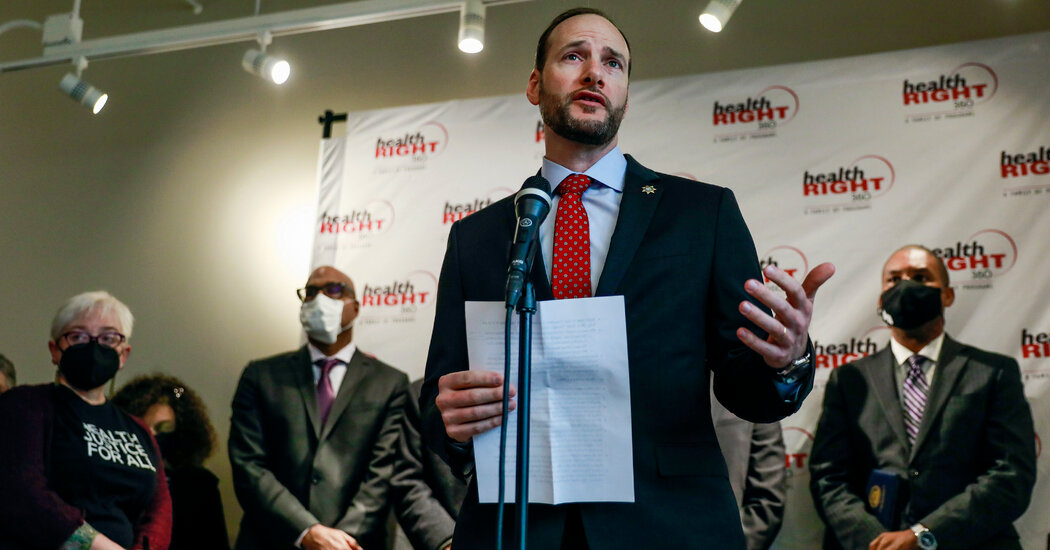At 8:24 p.m. on Nov. 2, 2020, Caroline Darian was a fortunately married 42-year-old working mom, near her dad and mom and two brothers, David and Florian, content material with a life so peculiar that she would later characterize it as “banal.”
Then, one minute later, she turned somebody very totally different. The cellphone rang and her life was cut up in two.
From that second, Darian’s private timeline would exist on two opposing planes: The years earlier than she discovered that for greater than a decade, her father, Dominique Pelicot, had systematically drugged, raped and enabled greater than 70 males to rape her mom, Gisèle Pelicot, and the times, weeks and months that adopted.
Days, weeks and months that Darian chronicles with highly effective precision and element in “I’ll Never Call Him Dad Again: Turning Our Family Trauma of Sexual Assault and Chemical Submission Into a Collective Fight,” printed in the USA in March. (Caroline Darian is a pen title for Caroline Peyronnet.)
“Later on, I learned that those who experience sudden trauma can often only recall a single isolated detail — a smell, a noise, a particular sensation; something infinitely small, which expands to take up all the available space, ” Darian writes. “For me it’s the clock on the cooker. Twenty-five minutes past eight, etched in stark white.”
In 2020, Dominique Pelicot was arrested for “upskirting” — making an attempt to take photographs beneath the skirts of three ladies. In the course of the subsequent search of his cellphone and pc, police discovered an infinite cache of photographs and movies of Dominique and males he solicited on the web raping a drugged Gisèle.
Final 12 months, the world watched the Pelicot trial with a combination of horror and awe — horror on the enormity of the crime, which led to the conviction of 51 males, together with Dominique, and awe impressed by Gisèle’s braveness. The tiny lady with the crimson bob turned a feminist icon for her choice to waive her proper to anonymity and permit the trial to be made public as a way to shift the disgrace that always surrounds rape, from the victims to the perpetrators.

Gisèle Pelicot leaves the Avignon courthouse on Dec. 16, 2024, after listening to the protection’s closing plea on the trial of her ex-husband Dominique Pelicot, who was later discovered responsible of drugging her for almost 10 years and welcoming strangers to rape her at their house in France.
(Clement Mahoudeau / AFP by way of Getty Photographs)
However Gisèle was not the one sufferer as “I’ll Never Call Him Dad Again” makes clear. The worldwide bestseller, which was printed in France in 2022, is drawn from Darian’s journals of the dwelling nightmare that adopted Dominique’s arrest.
Day after day, Darian and her brothers tried to care for his or her mom as they grappled with a cascade of proof that the loving father and husband they thought they knew was, in actuality, a chilly, conniving and manipulative monster.
The varied issues they’d after Dominique and Gisèle moved from Paris to Mazan, a small city within the south of France, now stuffed them with guilt. Darian and different members of the family had been apprehensive sufficient about her mom’s episodes of mind-numbing fatigue, bouts of reminiscence loss and different bodily signs to take her to varied medical doctors. However, having no purpose to demand a toxicology report and with their father ascribing the signs to Gisèle’s tendency to “overdo,” they had been compelled to just accept obscure diagnoses related to growing older.
After the stunning revelations, reminiscences of their mom falling lifeless asleep on the dinner desk, being unable to recollect previous conversations and, in a single occasion, experiencing vaginal bleeding, took on new and agonizing which means.
Then, nonetheless reeling from the crimes dedicated in opposition to her mom, Darian was known as again to the Mazan police station to be proven two photographs of herself, asleep in an uncommon place, her buttocks uncovered to disclose panties that weren’t hers. Photographs she had completely no reminiscence of.
Confronted with these photographs, and the likelihood that she too had been drugged and raped, Darian skilled a psychological breakdown and required hospitalization. The passages recounting her shattered emotional state and her comprehensible concern of the sedatives that had been administered to calm her, are terrifying of their battered simplicity and readability of goal.
It was after this breakdown, Darian says, that she turned decided to jot down a near-journalistic account of her expertise.
“I started writing two weeks after I was released from a psychiatric hospital,” she says over Zoom from France. “It was a real deep need — I work in communications and this book became a means of survival. First putting down the words, then sharing as a form of therapy.”

Caroline Darian says she’s pleased with her mom’s choice to make the trial public. “I told her from the beginning that it could not be closed door,” she says. “I told her that would be a gift to only one person.”
(Arnold Jerocki / Getty Photographs)
She wished to recount her story as matter-of-factly as she may so individuals would possibly perceive how a criminal offense like this might be dedicated, and the widespread harm it had completed. “It isn’t just the Pelicot family that was destroyed,” she says. “All the other rapists had families too, families who had no idea what they were doing.”
As she labored by means of her personal anger, shock and grief, Darian realized that society’s ignorance of the prevalent use of medicine in sexual abuse was one purpose Dominique had been in a position to get away along with his crimes for thus lengthy.
“I’d heard of GHB, the date rape drug, but had no idea how widespread it had become,” she writes. “Nor did I know that rapists were turning more and more to sleeping pills and anti-anxiety medicine … my ignorance strikes me as almost culpable.”
With the French publication of “I’ll Never Call Him Dad Again” in 2022, Darian started a marketing campaign to boost consciousness concerning the position medicine play in rape and sexual abuse. “I’ve received so many testimonials from other women but also teenagers because of incest, when drugs are often used.”
With the #MendorsPas (Don’t Put Me Below) motion, Darian hopes to assist create medical and legislation enforcement protocol for investigations into potential circumstances of chemical submission.
“The [general practitioners] my mother saw, the neurologists, they couldn’t help,” she says. “They couldn’t analyze her symptoms properly because there were no trends available. We thought she had brain cancer. We thought she had Alzheimer’s.”
As soon as the reality was found, the small Mazan police power was not outfitted to cope with the character of the crimes or the emotional influence on the victims. “We were given this information, shown these images and then just left alone,” she says. “We were offered no support, we were totally alone.”
The majority of the proof police discovered concerned Dominique’s abuse of Gisèle, however Darian factors out that there have been additionally photographs of her and each her sisters-in-law — “no woman in our family was spared” — in addition to connections to cold-case rapes.
Final month, Darian filed new fees in opposition to her father, who can also be being investigated in reference to a number of chilly circumstances. Dominique has denied ever touching his daughter. “The original investigation lasted two and a half years, but the south of France is a very small place. They were overwhelmed. That is why the investigation focused on Gisèle.”
A second e book, not too long ago printed in France, is Darian’s account of the trial, throughout which she overtly challenged her father’s denial of harming her, and her work battling chemical submission. She has been working with a politician on a authorities report that she hopes will provide concrete options.
“I knew I needed to make this useful,” she says. “I am a mum, I have a job, but I want to add my own experience to help identify victims in France and the world. I’m an activist and I knew that if I had to go through this, it’s not by chance. I have the strength to carry it.”
Talking about her experiences, together with these early days when her life cracked aside, hasn’t develop into simpler with time — throughout a 45-minute interview, Darian’s voice chokes with emotion on multiple event, notably when talking about her mom. In “I’ll Never Call Him Dad Again,” Darian discusses Gisèle’s refusal to even take into account that Dominique would abuse Darian and the wedge that drove between her and her mom.
Darian is pleased with her mom’s choice to make the trial public. “I told her from the beginning that it could not be closed door,” she says. “I told her that would be a gift to only one person.” Gisèle can also be engaged on a memoir, “A Hymn to Life,” set to be printed early subsequent 12 months, however the mom and daughter have restricted communication.
“We are each on a different path,” Darian says. “It’s too heavy; she needs to recover. She needs to rebuild herself — she’s almost 73 — and me, I’m on another journey. Dominique was judged for her and that’s right. The way she’s handling this belongs to her, but it’s too painful for me. She is well-supported and is dealing with her life the way she decided to do. But we are not a family anymore.”
“Dominique succeeded,” she provides sadly. “He split our family in two.”



